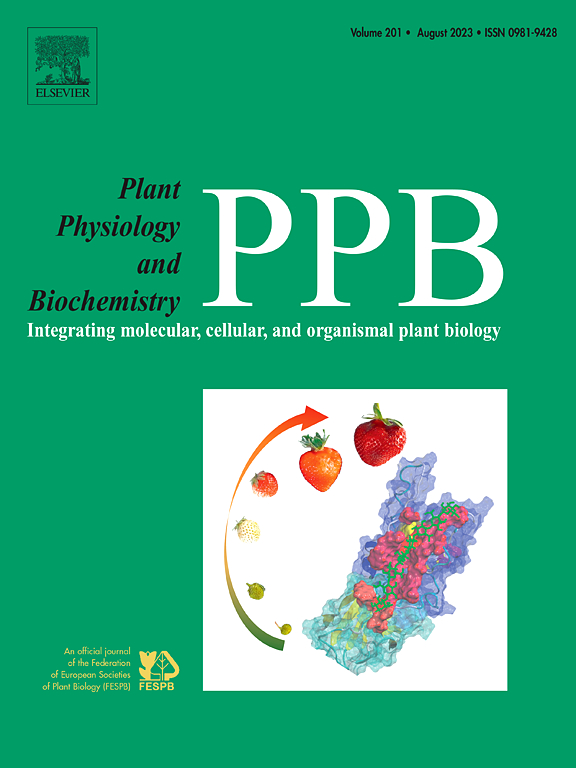DcMYB30通过调节类黄酮的生物合成而负向影响石斛的抗旱性
IF 5.7
2区 生物学
Q1 PLANT SCIENCES
引用次数: 0
摘要
干旱胁迫是一种严重的非生物胁迫,限制了植物的生长发育和产量。MYB转录因子家族在植物对逆境胁迫,特别是干旱的响应中起着至关重要的作用。然而,对石斛MYB基因家族的全面分析仍然有限,特别是关于双重复MYB蛋白对干旱胁迫的响应及其对类黄酮生物合成和积累的调控。严重的干旱胁迫抑制了悬连藤的生长,降低了其多糖和类黄酮含量。本研究鉴定了174个MYB基因,并对其系统发育关系、蛋白谱和表达模式进行了表征。共表达分析和瞬时表达实验表明,R2R3-MYB DcMYB30是黄酮合成和干旱响应的关键调控因子。DcMYB30定位于细胞核,在干旱胁迫下表达下调。在dcmyb30过表达的烟叶中,黄酮类化合物含量降低,多个黄酮类生物合成酶编码基因转录水平下调。综上所述,DcMYB30可能通过下调类黄酮途径酶编码基因(如4CL)负向调控类黄酮的生物合成,从而降低黄酮的生物合成或积累和耐旱性。本研究为揭示双重复MYB转录因子在植物胁迫反应中的生理作用提供了基础见解。本文章由计算机程序翻译,如有差异,请以英文原文为准。
DcMYB30 negatively function in drought tolerance of Dendrobium catenatum by modulating flavonoid biosynthesis
Drought stress is a severe abiotic stress, limiting the plant growth, development and yield. MYB transcription factor family plays a crucial role in plants response to adversity stress, particularly drought. However, a comprehensive analysis of the MYB gene family in Dendrobium catenatum remains limited, especially regarding the functions of two-repeat MYB proteins in response to drought stress and their regulation of flavonoid biosynthesis and accumulation. Here, severe drought stress inhibited the growth of D. catenatum and decreased polysaccharides and flavonoid contents. This study identified 174 MYB genes and characterized their phylogenetic relationships, protein profiles, and expression patterns. Co-expression analysis and transient expression assay revealed that an R2R3-MYB DcMYB30 was a key regulator in drought response and flavonoid synthesis in D. catenatum. DcMYB30 was found to localize in the nucleus and was down-regulated by drought stress. In both DcMYB30-overexpressing Nicotiana benthamiana or D. catenatum, flavonoid content decreased and transcript levels of multiple flavonoid biosynthetic enzyme-coding genes were downregulated. According to these findings, it is proposed that DcMYB30 may negatively regulate flavonoid biosynthesis by down-regulating flavonoid pathway enzyme-coding genes (e.g., 4CL), thereby reducing the flavonoid biosynthesis or accumulation and drought tolerance in D. catenatum. This study provides fundamental insights for characterizing the physiological roles of two-repeat MYB transcription factors in plant stress responses.
求助全文
通过发布文献求助,成功后即可免费获取论文全文。
去求助
来源期刊
CiteScore
11.10
自引率
3.10%
发文量
410
审稿时长
33 days
期刊介绍:
Plant Physiology and Biochemistry publishes original theoretical, experimental and technical contributions in the various fields of plant physiology (biochemistry, physiology, structure, genetics, plant-microbe interactions, etc.) at diverse levels of integration (molecular, subcellular, cellular, organ, whole plant, environmental). Opinions expressed in the journal are the sole responsibility of the authors and publication does not imply the editors'' agreement.
Manuscripts describing molecular-genetic and/or gene expression data that are not integrated with biochemical analysis and/or actual measurements of plant physiological processes are not suitable for PPB. Also "Omics" studies (transcriptomics, proteomics, metabolomics, etc.) reporting descriptive analysis without an element of functional validation assays, will not be considered. Similarly, applied agronomic or phytochemical studies that generate no new, fundamental insights in plant physiological and/or biochemical processes are not suitable for publication in PPB.
Plant Physiology and Biochemistry publishes several types of articles: Reviews, Papers and Short Papers. Articles for Reviews are either invited by the editor or proposed by the authors for the editor''s prior agreement. Reviews should not exceed 40 typewritten pages and Short Papers no more than approximately 8 typewritten pages. The fundamental character of Plant Physiology and Biochemistry remains that of a journal for original results.

 求助内容:
求助内容: 应助结果提醒方式:
应助结果提醒方式:


